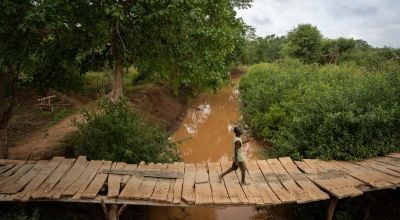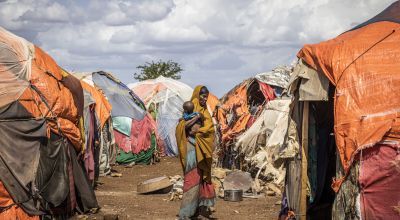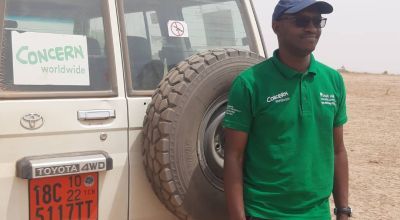
Read our 2023 annual report

Knowledge Hub
In a country like South Sudan, day to day life can be a constant struggle. Extreme weather events like drought and floods have combined with conflict to create widespread malnutrition amongst children. So fear increases when a mother, in the midst of a humanitarian emergency, prepares to give birth.
But thanks to the life-saving services provided by aid workers and healthcare professionals, there can be light amongst the dark.
Nyaphan Tut Deng, 19, was overjoyed to welcome her first child, a healthy baby girl named Nyaguande Kuon Diang, at the Rotriak Health and Nutrition facility in an area in the north of the country that is in the middle of a humanitarian emergency. Nyaguande weighed a normal 3.5kgs, something that gives the staff at the centre “hope for the future”.
The clinic is managed by Concern Worldwide with EU funding, and provides life-saving services to a community of about 27,000 people.
It treats some of the estimated 1.4 million children aged under five who are malnourished in South Sudan.
“A healthy birth like this gives us hope for the future,” said Abdul Ghaffar, a programme coordinator with Concern, whose colleagues helped deliver the child.
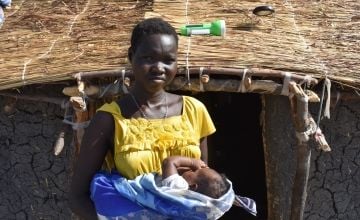
“We just hope that Nyaguande’s family will stay healthy because these are very hard times for so many right now.”
Nyaphan said that while she was delighted with the healthy birth of her first child, she is worried for her future.
“The living conditions here in Rotriak are very difficult,” she said.
“We are staying in a poor quality shelter with poor structure and it has no good plastic sheeting.
“We are also running out of food stock and my baby seems like she is not satisfied from the breast milk. When she was born she was very healthy, but now she is not growing fast and I think it’s because of a lack of feeding at home. Neither my husband or mother are working.
“I would like this organisation and the rest of the organisations to support us with food, shelter, water, nutrition and health services.”
The health facility where Nyaguande was born is in an area damaged by floods and rated as “IPC4” by the UN’s food security monitors – which means it is in a state of emergency and one rating below a famine declaration.
When a child is acutely malnourished, he or she becomes so weak they cannot cry. It is a sobering silence that we strive to prevent.
Concern opened the clinic in April 2022 after a previous facility in a different location was submerged by floods, forcing the entire population to evacuate to Rotriak.
They have treated thousands of children suffering from malnutrition, which can be fatal if not treated, and they also help pregnant women and breastfeeding mothers in need of emergency food supplements.
Nyaguande is one of 335 babies delivered by staff so far at the health facility, which relies on overseas funding.
“We are doing everything we can with everything we have for these children and the thousands who come to us with their mothers in desperate need of food and treatment for malnutrition,” added Abdul Ghaffar.
“When a child is acutely malnourished, he or she becomes so weak they cannot cry. It is a sobering silence that we strive to prevent.
“Since this facility was set up in Rotriak, Concern in collaboration with the County Health Department, has been providing integrated health and nutrition services to about 27,000 people.
“This place, like many other locations in Unity State, has not been spared from the impact of climate change, continued conflict and is among the highest ranked locations with food and nutrition insecurity in the country.
“The integration of health and nutrition services here is proving essential for a comprehensive quality level of care in an area with such extreme poverty and need.
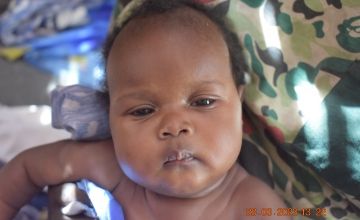
“This also includes immunisation from serious illnesses, help with early child development and life-saving referrals to hospitals.
“Children and women coming here are all screened for malnutrition and educated about nutrition in the hope that fewer children will become undernourished.”
After a peaceful secession from Sudan, the Republic of South Sudan became Africa’s 54th country and the newest country in the world on July 9, 2011.
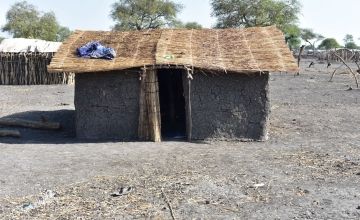
It is one of the hungriest and poorest countries in the world with its many crises worsened by floods in 2021 that impacted over one million people.
South Sudan is ranked last out of the 191 countries in the Humanitarian Development Index, which is compiled by the UN to measure levels of social and economic development in countries.
Some parts of the country experienced famine that lasted several months in early 2017, affecting an estimated 5 million people.
The number of internally displaced people in the country rose from 2 million in 2022 to 2.2 million people in 2023.
Concern has been in Sudan since 1985 and in South Sudan since its formation, providing emergency aid and long-term development programming.



